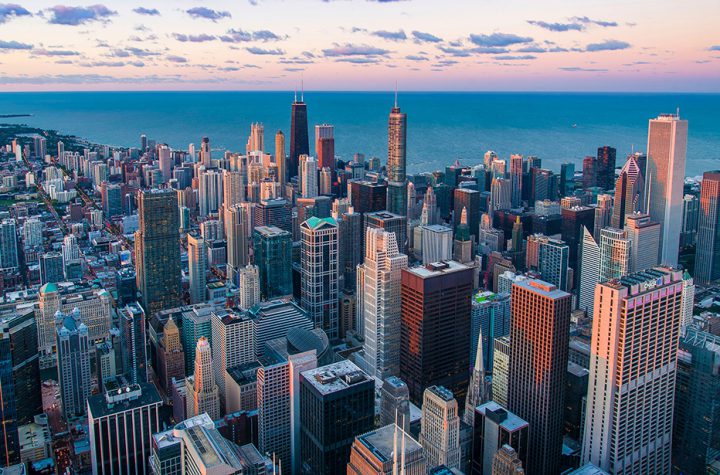
Mind the Gap, the secretive group quietly reshaping big-money politics in Silicon Valley, is aiming to spend as much as $140 million to boost Democrats in the 2020 election, Recode has learned.
If realized, a haul of that size would cement the group, little known until Recode reported on it this week, as one of the most powerful forces in Democratic politics. And the group is accomplishing this all behind the scenes without any prior public scrutiny.
This network of Silicon Valley donors raised $20 million for Democratic causes and congressional candidates in advance of the midterms. But the group has far greater ambitions in a presidential cycle: Mind the Gap told prospective donors last fall that it had already raised at least $35 million in political contributions for voter registration efforts, which is part of a fundraising goal that could stretch to $100 million, according to a memo obtained by Recode.
Mind the Gap is also seeking another estimated $30 million for get-out-the-vote work along with another estimated $10 million for orphan races which means primarily funding candidates for state legislatures that the group sees as wrongly under-funded. Thats in part thanks to the arrival of a new fundraising aide, Erica Slates, who recently joined the effort from Jay Inslees now-ended presidential campaign.
All told, the groups 2020 efforts reveal two fundamental things about this political moment:
- How fervently Silicon Valley millionaires and billionaires want to get rid of Donald Trump, so much so that they are willing to entrust millions of dollars to a trio of Stanford academics with no prior fundraising experience.
- How a new class of Democratic operatives and donors are disregarding concerns within their party about the role of money in politics and capitalizing on campaign-finance law to influence elections with limited disclosure to the public.
Mind the Gap is now asking for a minimum suggested contribution of $40,000, according to the memo but it warns that even that is not enough. (Mind the Gap leadership previously denied to Recode that it has had any minimum contribution requirements.)
We will never get to our goal without substantially greater contributions from those who are in a position to make them, the group said in its memo. But whatever you are able to give and wherever you choose to direct it, we encourage you to be both strategic and generous. This is the most important election of our lifetimes, with grave and in some cases irreversible implications for the country and the planet if we dont win.
Mind the Gap did not immediately respond to a request for comment for this story.
In 2018, the group, which is led by Stanford law school professor Barbara Fried, raised about $500,000 for 20 different Democratic congressional challengers, many of whom were underdogs to win their bids. Ten of them won. Mind the Gap became a hit in Silicon Valley in particular because it asked tech leaders to fund races where it had calculated each dollar would have the greatest marginal impact on Democrats taking back the House, which synced with the industrys data-driven thinking.
This time around, the group is asking its donors to fund three separate voter-registration programs: the Voter Participation Center (VPC) and the Center for Voter Information (CVI), which in September alone sent out 7.1 million voter registration applications by mail, according to Mind the Gap. The last endorsed group is Everybody Votes (EV), which is training organizers to sign up voters in local communities and has used some of the $35 million that Mind the Gap has already raised to register Democratic voters in Wisconsin, Michigan, Pennsylvania, and Minnesota. (Future money from the group is going to do the same in Florida, Arizona, and Nevada.)
At current funding levels, the VPC, CVI, and EV programs together will be the largest voter registration drive in US history. Fully funded, they are projected to add roughly 3,000,000 people to the voter rolls, chiefly from communities of color, and yield 750,000 additional net votes in the November 2020 election in competitive battleground states across the country, the group told its donors in a separate, year-end memo last month. Historical data suggest that 40-50% of these new voters will go on to vote in the 2022 elections without any additional campaign or GOTV encouragement.
Almost all of the donations to these groups are tax-deductible, Mind the Gap reminds its donors. Thats because of rules that allow foundations, donor-advised funds, and individuals to write these gifts off under the name of philanthropy even though the donations are routed by a Democratic interest group.
Meanwhile, Mind the Gap has taken pains to avoid pubic detection since its inception. In a section of the fall memo titled Discretion, the group implored its donors to not circulate any of the highly sensitive information and says that information is only available through its encrypted website.
In 2018, we managed to stay out of the news and as far as we know out of Republicans sightlines through the entire cycle, notwithstanding that we ended up being one of the top two fundraisers for House races, the group boasted. We do not expect to be so lucky this cycle.
It will come as no surprise to Republicans and be of little interest that yet another organization is trying to fund voter registration in battleground states, the group says in its memo. But the magnitude of our efforts, the details of targeting, and the names of the organizations we are recommending, would be of great interest to them. If that information becomes public, it would make [Mind the Gap] and the donee organizations targets for Republicans and enable them to ramp up voter suppression efforts and other tactics at their disposal.
That type of language likely worries those who worry about the impact of money in politics, including many on the left. While Mind the Gaps leaders hold themselves out to be merely pro bono donor advisers, the memo and its fundraising success so far makes it clear they are amassing tremendous power in Silicon Valleys new political moment.





More Stories
The South Australian government has promised to deliver the “biggest hit of economic adrenalin in South Australian history” in Tuesday’s budget.
Boris Johnson will proceed with his controversial Brexit bill despite US president-elect Joe Biden having previously warned the UK over the draft legislation.
Singapore-based Nektar.ai, a productivity platform for sales teams, has raised $2.15 million in seed funding. Founded earlier this year, Nektar has been working in stealth mode with five companies, and has plans for an early adopter release before a public la…